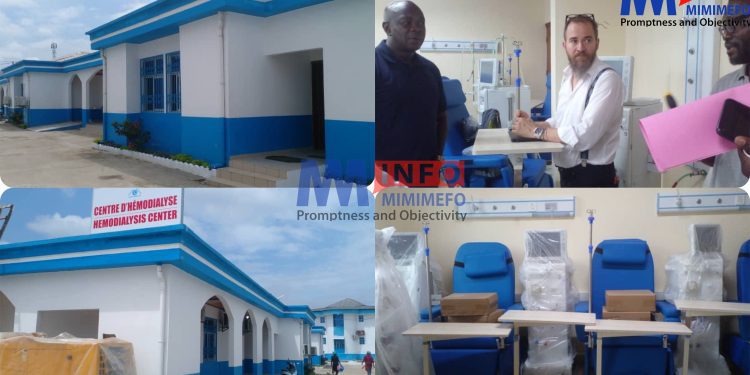The Hemodialysis Centre of the Laquintinie Hospital in Douala will be officially inaugurated by the Minister of Public Health, Dr. Manaouda Malachie, today, September 29, 2023.
The new building, which includes the Nephrology Department, will enhance the technical capabilities of this healthcare facility. Additionally, it will offer patients with this serious condition the necessary care at a reduced cost.
The Laquintinie Hospital Haemodialysis Centre was fully constructed and furnished using funds from the State budget. The facility can accommodate up to 22 state-of-the-art hemodialysis machines. The facility is equipped with two modern water treatment rooms. These rooms are backed up by a generator set with a capacity of 120 KVA. Additionally, there is a borehole on the premises that can store up to 10,000 liters of water. Sufficient measures are in place to guarantee autonomy in the operation of the facilities.
Why it promises to be unique
The Laquintinie Hospital Hemodialysis Centre offers open generators, which makes it stand out. Various manufacturers can accommodate kits and inputs with these generators. Closed generators only accept kits and inputs made by the equipment manufacturer, in contrast to this. Other hemodialysis centres commonly observe inconveniences when they use closed generators.
A team of highly trained and qualified staff will provide care to the patients. Three nephrologists, one general practitioner, one chemist, and eleven nurses make up this team. Additionally, experienced support staff will provide the necessary assistance.
Laquintinie Hospital Hemodialysis Centre’s inauguration signifies a significant advancement in the battle against kidney failure in Cameroon. A greater number of patients will receive high-quality care at a reduced cost. Especially at this moment, the inadequate care system has been affecting many patients’ treatment, and they have been expressing their dissatisfaction.
Victims Share Their Stories.
Talking to MMI in an exclusive interview, Kamgaing Roger a kidney failure patient living in Yaounde who has been suffering with it for 9 years decried the manner in which they are handled in Cameroon
“I have had kidney failure issues for 9 years today and have been suffering a lot because of it and what worsens things is the low quality of treatment we receive especially with the Ministry of Health doing nothing to sort the issue out,” he said.
“We have an eternal problem in water autonomy, we do not have drilling at the University Hospital of Yaoundé and from time to time the Dialysis is stopped for that,” he added.
When we asked about measures the government could use to solve some of the problems they encounter, especially the problem of insufficient adequate dialysis centres, patients sometimes travel from different regions to the other. We have had patients go on strike because of the distance they have to cover just for dialysis. Roger spoke.
“It is really to deplore, we think that if the state multiplies the centers throughout the country it would relieve congestion in Yaoundé and Douala. You see when the different problems arise in our respective dialysis centers, we cannot go to Dialysis elsewhere because they there are also saturated. Usually, the number of patients is always greater than the number of machines. The ministry should resupply the centers with machinery from time to time and ensure follow-up”.
“In fact when I started dialysis I was living in Bafoussam and there was no dialysis there. So I was going to do it in Bamenda and later I was sent to the hospital of Ebolowa and today I am doing it at the University Hospital of Yaounde. Patients like us have normally 2 dialysis sessions to do per week, but due to insufficient machines, we do it once a week at times just once a month which is very dangerous” he added.
Roger is pleading with the government through the Ministry of Public Health to come to their aid before they all perish.
“I plead with the ministry to look into the problem of hemodialysis centers. Many patients die, sometimes because of a simple water seizure, so if the ministry could offer us boreholes in hemodialysis centers it would be the beginning of a solution to our multiple problems” he pleads.
Understanding Kidney Failure
It is crucial to understand that kidney failure is a medical condition where the kidneys lose their ability to effectively filter waste products from the bloodstream. There are several factors that can contribute to this condition, such as diabetes, high blood pressure, and glomerulonephritis (kidney inflammation).
Fatigue, nausea, vomiting, and swelling in the feet and ankles can indicate the initial signs of kidney failure. As the disease advances, individuals may experience symptoms such as difficulty breathing, chest discomfort, and seizures.
Although there is currently no cure for kidney failure, healthcare professionals offer various treatments that effectively manage symptoms and extend the lifespan of individuals. Doctors use dialysis and kidney transplantation to treat kidney disease.
The procedure of dialysis effectively removes waste products from the blood. Hemodialysis and peritoneal dialysis are the two primary types of dialysis.
Healthcare professionals typically conduct hemodialysis in a clinical or hospital setting. The machine effectively removes waste products and excess fluid from the patient’s blood during the process of hemodialysis.
Patients can conduct peritoneal dialysis in the comfort of their own homes. In peritoneal dialysis, the medical staff uses a catheter to pump a fluid called dialysate into the abdomen. The dialysate absorbs waste products and excess fluid from the blood.
Surgeons perform kidney transplantation by transplanting a healthy kidney into the patient’s body. Medical professionals widely regard kidney transplantation as the most effective treatment for kidney failure; however, it is important to note that kidney transplantation may not always be a viable option.



